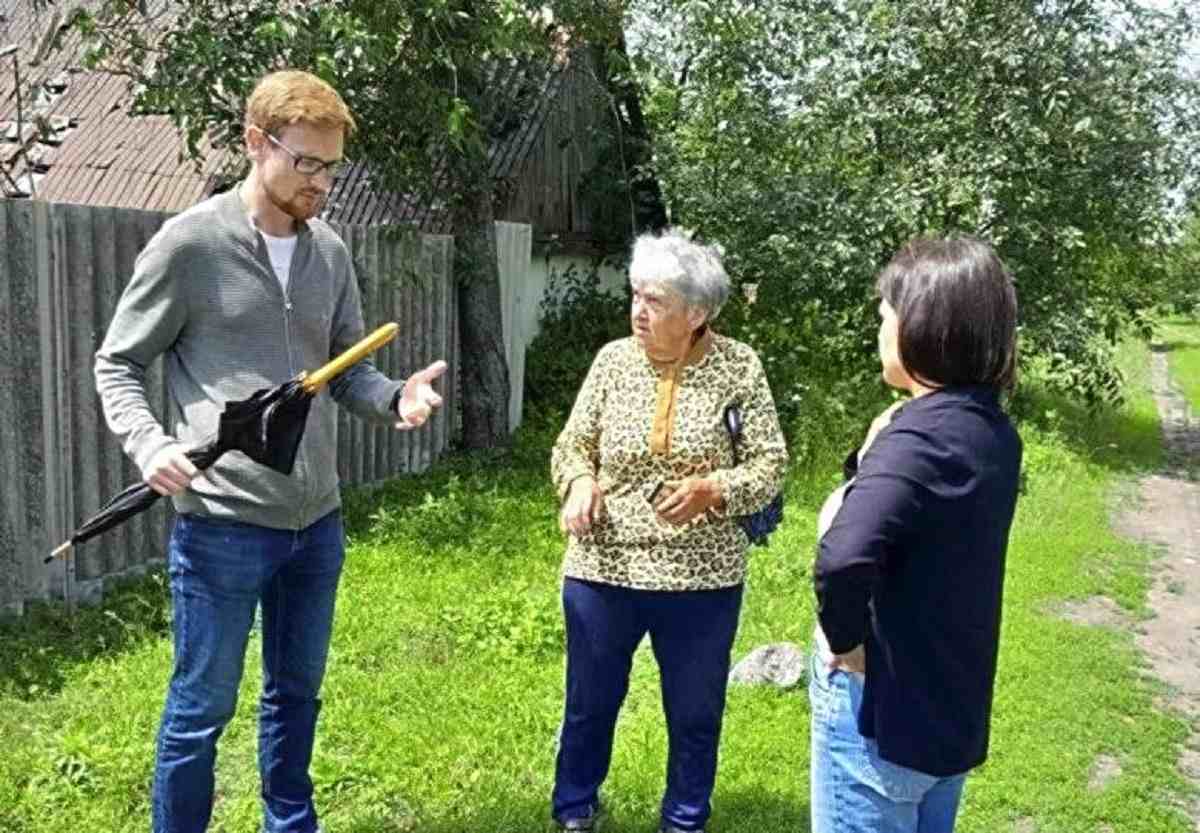- Political Series
- Future World Order
International Organizations / NGOs Gather Evidence to Put Onus on Russia for War Crimes

Staff from a Ukrainian nongovernmental organization ask resident Nadiia Herasymenko, center, about a Russian attack last year in her village on the outskirts of Kyiv on June 29.
11:57 JST, July 20, 2023
This is the fourth installment of a series examining how international organizations are at a critical juncture due to changes in the global situation, such as Russia’s invasion of Ukraine.
***
Seven days after Russia began its invasion of Ukraine, a farming village about 40 kilometers northeast of Kyiv was surrounded by Russian tanks. Village resident Nadiia Herasymenko had preferred not to speak about what happened on March 3, 2022.
But she slowly opened her mouth when two staff members of a Ukrainian nongovernmental organization visited the village in late June this year to find out more details about the atrocities committed by the Russian military.
Herasymenko, now 69, told them the Russian military approached her home and opened fire with machine guns. One of her sons was smoking outside and shot to death. Another son was seriously injured. The rampaging Russian soldiers said they were venting their anger over the killing of their commander.
The NGO Center for Civil Liberties, which shared the 2022 Nobel Peace Prize, conducts such fact-finding inquiries in preparation for criminal prosecutions. In principle, the NGO shares its database of information gathered at these sites and elsewhere with the authorities. Even more than a year since Russian troops withdrew from some of these villages, many sites have not had investigations conducted.
“The work is not progressing well,” said staff member Natalia Yashchuk, 45. “But the important thing is to carry out our work, bit by bit, for future prosecutions.”
As of July 13, Ukrainian authorities said they were aware of 97,907 war crimes committed by the Russian military. To pursue responsibility for the vast number of crimes, the International Criminal Court and the governments and NGOs of Germany and France, which have domestic laws that allow them to hand down punishment for crimes committed abroad, have stepped in to assist Ukraine.
German NGO the European Center for Constitutional and Human Rights is advising Ukraine on how to prepare evidence to be submitted to court. The idea is to bring before the ICC the issue of “supervisory responsibility for Russian soldiers.”
“The goal is to get an arrest warrant issued for the most high-ranking officer possible,” said an ECCHR member working on the case.
High hurdles
Ukrainian President Volodymyr Zelenskyy delivered a speech at ICC headquarters in The Hague in May, demanding that Russian President Vladimir Putin be brought to justice. He also called for the establishment of an international tribunal to try Russia for its acts of aggression.
The ICC is a permanent international criminal justice organization that pursues the criminal responsibility of individuals charged with genocide, war crimes, crimes against humanity and the crime of aggression. Japan, France, Germany and the United Kingdom are among the 123 member countries and regions that have ratified the treaty to establish the ICC.
In March, the ICC issued an arrest warrant for Putin in connection with alleged war crimes concerning the deportation and illegal transfer of children from Ukraine.
However, the hurdles to prosecuting those involved in war crimes are high. Especially so when Russia is not a member of the ICC, so it does not need to cooperate with the investigation, let alone take those involved into custody.
If Russia’s aggression is unquestionably tolerated, the world will revert to one where the strong prey on the weak. Nations that share Ukraine’s sense of danger are cooperating to collect evidence in preparation for the day when Russia will be brought to justice for its war crimes.
Top Articles in Politics
-

Japan PM Takaichi’s Cabinet Resigns en Masse
-

Sanae Takaichi Elected Prime Minister of Japan; Keeps All Cabinet Appointees from Previous Term
-

Japan’s Govt to Submit Road Map for Growth Strategy in March, PM Takaichi to Announce in Upcoming Policy Speech
-

LDP Wins Historic Landslide Victory
-

LDP Wins Landslide Victory, Secures Single-party Majority; Ruling Coalition with JIP Poised to Secure Over 300 seats (UPDATE 1)
JN ACCESS RANKING
-

Japan PM Takaichi’s Cabinet Resigns en Masse
-

Japan Institute to Use Domestic Commercial Optical Lattice Clock to Set Japan Standard Time
-

Israeli Ambassador to Japan Speaks about Japan’s Role in the Reconstruction of Gaza
-

Man Infected with Measles Reportedly Dined at Restaurant in Tokyo Station
-

Videos Plagiarized, Reposted with False Subtitles Claiming ‘Ryukyu Belongs to China’; Anti-China False Information Also Posted in Japan






















